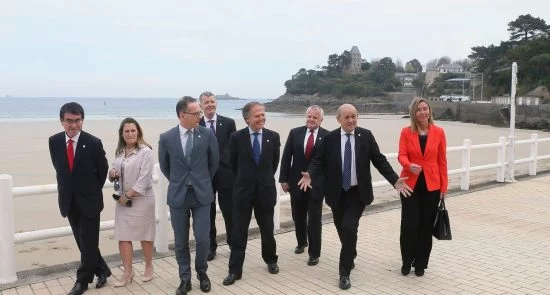No Consensus Reached in G-7 Ministers Meeting on Middle East
Foreign ministers from the Group of Seven nations failed to reach consensus on key Middle East issues on Saturday as they wrapped up a meeting in France that was shaken by the absence of U.S. Secretary of State Mike Pompeo.
Ariana News Agency-
The diplomats in attendance projected a united front while walking side-by-side along a seaside promenade before they released the agreement from their two-day meeting in Dinard. The agreement included mildly worded joint commitments on issues such as fighting cybercrime, giving women bigger peacemaking roles, and engaging with countries in Africa’s Sahel region to combat migrant trafficking.
But what was omitted from the G-7’s positions said as much as what was included. The differences could set the stage for tensions at an August summit of the leaders of the G-7 advanced economies — the United States, France, Canada, Japan, Germany, Italy and the U.K.
A European Union official expressed “regret” the document had what she considered to be several glaring omissions that conflicted with non-negotiable positions of the EU. They included “no reference to a two-state solution” in the Israeli-Palestinian conflict and “no mention” of the U.N. Security Council resolution in favor of the Iran nuclear deal, she said.
The official, who spoke on condition of anonymity because she was not allowed to speak to the news media, said the language used to described the G-7’s deep concern over Iran’s “continuing support for terrorist organizations and armed militias” was not language EU members tend to use. Four of the G-7 nations are in the European Union.
The foreign ministers’ joint statement itself acknowledged “clear differences” on the Israeli-Palestinian conflict after “an exchange of views.”
The agreement included an initiative to help countries share best practices on encouraging responsible online behavior. Also, the group pledged to encourage the creation of funds to help survivors of sexual violence in danger spots, and to encourage Sahel countries to take steps to end trafficking. It also reaffirmed the G-7’s “commitment to a rules-based international order.”










